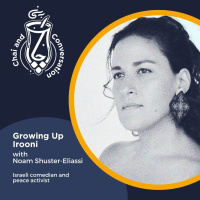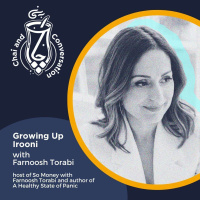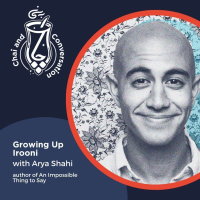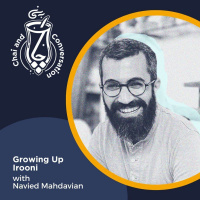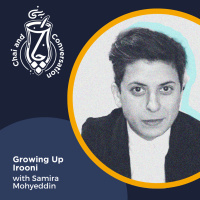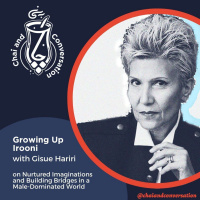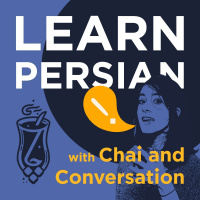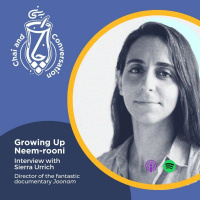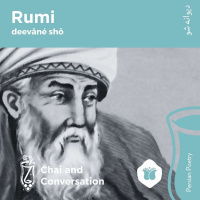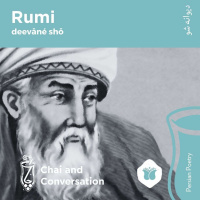Synopsis
Learn Persian with Chai and Conversation teaches you conversational Persian in a fun and casual manner in weekly lessons of about 15-20 minutes each. Check out our website chaiandconversation.com for more information.
Episodes
-
Noam Schuster-Eliassi, Israeli comedian and activist, on the current state of affairs in Israel, and her Iranian-Israeli identity
25/01/2024 Duration: 01h06minFrom the very beginning of this current stage of the conflict, after the horrific events of October 7th, the first person I turned to for an understanding of what was happening was Noam Shuster-Eliassi. I’d been following her for a long time because of her comedy about Israel and Palestine. I had so many questions to ask her, and was so incredibly grateful that she took the time to speak to me. There are no easy answers, and I will let the interview speak for itself. I thank you for taking the time to listen. Related LinksNoam’s speech from 2015Noam’s instagram pageStanding Together- a grassroots Jewish-Arab movement fighting for peace, equality and social justice in Israel/Palestine.
-
Farnoosh Torabi, on Living in a Healthy State of Panic
04/10/2023 Duration: 38minIn this episode of Growing Up Irooni, host Leyla interviews Farnoosh Torabi, renowned podcast host and author of the book "A Healthy State of Panic." Leyla and Farnoosh delve into the world of finances, personal development, and the positive aspects of fear. Farnoosh shares her insights on fear and how it can be a powerful force in our lives when understood and harnessed correctly.Related Links: Podcast Website: www.chaiandconversation.com Book Mentioned: "A Healthy State of Panic" by Farnoosh Torabi Farnoosh Torabi's Podcast: "So Money with Farnoosh Torabi" Farnoosh Torabi's instagram
-
Interview | Arya Shahi, author of An Impossible Thing to Say
27/09/2023 Duration: 01h24minI’m so excited to share with you my interview with Arya Shahi, author of the fantastic new debut novel, An Impossible Thing to Say. It’s coming out this week, September 26th 2023, so no matter when you’re listening to this interview, please drop everything and go buy it- you will love it.So as a brief introduction, Arya Shahi is an Iranian-American multidisciplinary artist. He is a co-founder of PigPen Theatre Co., the award-winning theatre company and band. With PigPen, Arya has written, directed, and performed in original musicals as well as books adapted for stage. Arya’s debut novel, An Impossible Thing To Say, has been published by HarperCollins and Arya will direct the Pulitzer Prize-winning English at The Old Globe in early 2024.We actually ended up recording this interview on September 11th, which is interesting because September 11th was a big part of this novel. I had been looking forward to talking to Arya for a long time, and our conversation did not disappoint- we could have talked for hours more
-
Interview | Navied Mahdavian, author of This Country, Searching for Home in (Very) Rural American
13/09/2023 Duration: 36minSo excited to share that Navied Mahdavian's incredible debut graphic memoir, This Country: Searching for Home in (Very) Rural America is NOW OUT and available for purchase! And to celebrate, I’m so excited to share with you all the conversation I had with Navied after reading his incredible his work.The book is set in rural Idaho where Navied moved with his wife and dog in November 2016- yes, the month Trump got elected. I could NOT put the book down and enjoyed reading it immensely- it brought up so many issues we all think about so much, like issues of identity, language, culture, being “others”- I had so many questions for Navied and feel so lucky I got to sit down and ask him some of them. He’s delightful to talk to, and I’m sure you’ll enjoy the conversation as much as I did.Related Links:Navied Mahdavian on InstagramNavied's comic about Iran
-
Interview | Growing Up Irooni: Samira Mohyeddin on Navigating Culture, Identity, and the Reverberations of Politics
11/09/2023 Duration: 01h03minIn this episode, we dive into an enriching conversation with Samira Mohieddin, discussing her experiences growing up in a Persian family that migrated to Canada. We unpack the challenges and dynamics of navigating multiple cultures, languages, and political climates.Highlights: Samira reflects on her sudden rise in Instagram followers and the oddity of newfound attention. A mention of Ari's project, Water Well, and its resonance post-George Floyd protests. Samira shares her early life in Tehran and the subsequent move to Canada when she was just four years old. The move was prompted not by choice but by necessity due to political upheavals. We learn about the initial struggles of adapting to a new country, including linguistic hurdles. Her family was a blend of French, English, and Persian speakers. Samira candidly discusses her experiences in Persian school, a journey filled with mischief, laughter, and some rebellious moments. A poignant memory of the aftermath of the Iran hostage crisis is recounted, showc
-
Growing Up Irooni: Gisue Hariri on Nurtured Imaginations and Building Bridges in a Male-Dominated World
31/08/2023 Duration: 01h16minIn the latest episode of the "Growing Up Irooni" podcast series, I had the unique privilege of sitting down with the iconic Gisue Hariri, one half of the brilliant duo behind Hariri & Hariri Architecture. In this intimate conversation, Gisue delves into the intricacies of growing up in the southern part of Iran, where the environment fostered imagination, resilience, and a profound connection to nature. She candidly shares the challenges and triumphs she faced as a female architect, breaking barriers in a traditionally male-dominated profession. From her experiences at Cornell University to designing a coffee shop in New York City with Colombian architects, our discussion traverses the intersections of culture, architecture, and womanhood. Whether you're an architecture enthusiast or someone intrigued by personal narratives of struggle, triumph, and identity, this episode promises a heartfelt journey through the eyes of one of Iran's pioneering architectural minds. Tune in to witness how Gisue's unique up
-
-
-
Interview | Growing Up Irooni: Sierra Urich
05/07/2023 Duration: 57min"Finding Joonam: A Dialogue with Filmmaker Sierra Urrich" - Immerse yourself in a candid and emotive conversation with Sierra Urrich, the talented director behind the striking documentary, 'Joonam'. In this episode, Sierra shares her heartfelt experiences of creating the film and navigating her Iranian identity through the process. She provides us with an intimate glimpse into her journey, spanning from her childhood in Vermont to her connections with Iran, sparked by the stories, culture, and heritage shared by her mother and grandmother. We discuss the complexities of learning Persian, the multifaceted portrait of three generations of women against Iran's cultural backdrop, and the powerful reactions to the brave protests happening in Iran. This dialogue will undoubtedly resonate with anyone who has ever sought to understand their roots, grappled with their identity, or felt the echoes of a diasporic existence. Tune in for an enriching exploration of heritage, identity, and the extraordinary potency of stor
-
Poetry | Rumi's deevané shō Part 3
03/07/2023 Duration: 11minContinuation of our discussion of Rumi's deevāné shō
-
Poetry | Rumi's deevané shō Part 2
26/06/2023 Duration: 11minIn this second part of the discussion for Rumi's deevāné shō, we go over the first two lines of the poem in detail.
-
Interview | Growing Up Irooni: Marjan Kamali
22/06/2023 Duration: 50minHost: Leyla ShamsGuest: Marjan KamaliIntroduction:Leyla Shams, host of Learn Persian with Chai and Conversation, introduces her guest Marjan Kamali, the award-winning author of the Stationary Shop.Topics Discussed: Marjan Kamali's The Stationary Shop Recommended by the founder of Ketab Club, Kimia, as the number one book by a middle eastern author. Leyla shares her experience reading the book with a dozen other women and the emotions it evoked. Setting and Historical Context Unlike the common discourse about the 1979 revolution, this novel is set during the 1953 coup in Iran. Discussion on how the 1953 coup altered the course of Iranian history. Insight into how the novel shows that the coup was a significant event leading to a loss of hope and irreversible change for Iran. Discussion with Marjan Kamali The inspiration behind the novel. Kamali's thoughts on current events in Iran and her predictions for the future. Recommendations: Leyla highly recommends her listeners to read The Stationary Shop. En
-
Poetry | Rumi's deevané shō Intro
19/06/2023 Duration: 36minIn this intro lesson for Rumi's deevāné shō, we go over the full poem with musician Fared Shafinury.In addition, we learn about Fared and his project "Radif Retreat". In this particular lesson, we also dive into the musicality of the poem and how to interact with it rhythmically. Watch Fared's performance of Rumi's beautiful poetry on his Persian After Hours performance, live at the Guggenheim.
-
Interview | Growing Up Irooni: Kayvon Zand on inclusivity in the zan zendegee azadee era
24/05/2023 Duration: 01h13minKayvon Zand is a nightlife personality and musician living in New York City, and goes by the pronouns he or they. I’ve been a fan for years, and love their extravagant and very extra style. In the past year, Kayvon has been turning their attention to Iranians in Iran, and holding live discussions with them about a variety of topics, most notably how life is like for members of the LGBTQ+ community in Iran. I sit in on them every once in a while, and the discussions are often quite fascinating. Since the beginning of the zan zendegee azadi movement also, Kayvon has been really vocal in connecting this movement with the cause of queer rights in Iran, and showing how they are inextricably linked. We talked about his relationship to Iranian culture, the language, but also about the history of the LGBTQ+ community in Iran and how things have changed and how they haven’t.Related Links: Kavyon Zand on instagram Kavvon's new Koloocheh video
-
Interview | Growing Up Irooni- Ari Rastegar and the business of being Iranian
10/05/2023 Duration: 23minIn this episode, we talk to Ari Rastegar, a commercial real estate developer in Austin, Texas. Ari talks about his half Iranian background, how his father instilled the Iranian culture in him, and how it's helped him develop his empire in Austin.
-
Interview | Growing Up Irooni- Nixta Taqueria's Sara Mardanbigi Makes Contact with the Motherland
25/04/2023 Duration: 48minNixta Taqueria is an award winning taqueria in Austin coowned by today's Growing Up Irooni guest Sara Mardanbigi. She owns it together with her husband Edgar Rico, who she recently took on a month long trip to Iran. We talked about her upbringing in Arkansas, what led her to create such a unique business, and about her recent trip to Iran, amidst the women, life, freedom movement. Related Links: Priya Krishna's NYT article about Sara and Nixta Follow Nixta on Instagram
-
Interview | Growing Up Irooni- Funny in Farsi 20 years later, with Firoozeh Dumas
12/04/2023 Duration: 39minI’m so excited to share with you today my interview with Firoozeh Dumas, author of Funny in Farsi. Funny in Farsi came out when I was in college, and it’s almost hard to remember what a huge huge deal it was at the time. Really, before that, we had zero mainstream representation of Iranians. The one thing we had that we could all point to was not without my daughter, and that was a horrifying depiction of what Iran and Iranians were. But then Firoozeh came out with her book, which is a delightful, funny, heartwarming memoir of what it’s like to grow up with an Iranian background in the USA. She touches on what it was like during the hostage crisis, and when Iranians were constantly negatively stereotyped in the media. But she also looked at the really lovely positive things that came from being an immigrant in this country. Iranians are often not allowed the levity of talking about their experiences in a way that say Greek people are in a movie like my big fat greek wedding. That movie was allowed to be funny
-
Poetry | Monir Taha's meegan ké jangé jangé Intro
08/03/2023 Duration: 45minIn this first lesson on Monir Taha's poem ‘meegan ké jangé jangé, میگن که جنگه جنگه’, we talk to Naz Deravian, Monir's daughter and author of the cookbook Bottom of the Pot, about the poem in general, the context in which it was written, and about the poet herself.
-
Interview | Growing Up Irooni- Moj Mahdara on the Iranian Diaspora Collective
25/01/2023 Duration: 54minThis interview with Moj is the first I've done for the Growing Up Irooni series since the death of Mahsa Amini on September 16th. So much has changed since then for Iran and especially for the Iranian Diaspora. As one of the cofounders of Iranian Diaspora Collective, I couldn't think of a better person to talk through these changes than Moj Mahdara. They are a venture capitalist and very well known in that world, but before the events that took place in September, they admittedly weren't too involved in or interested in the Iranian diaspora community. But the events stirred a worldwide movement and feeling of connection within the diaspora community, and we talked through that together! Related Links: Moj's Instagram Iranian Diaspora Collective
-
Interview | Growing Up Irooni- the Real Tara Joon
24/08/2022 Duration: 51minThe Real Tara joon is a social media content creator, which is not our general interviewee target. But, she has amassed a massive following on Tiktok, with almost 1 million followers, and even though she just started on Instagram, she has over 200 thousand followers there as well. Her videos really resonate with people from all over the world, but here’s the interesting thing- she’s Iranian, with an accent, and is a proud Muslim that wears hijab. The thing that stood out to me is that most of her followers are not Iranian or Muslim, and most of her fans don’t even comment on the fact that she’s an Iranian muslim scarved woman- they just focus on her comedy, and relatable stories about her husband and things like eating snacks. If you scroll through her comments enough though, you’ll see some really hateful ones- and most of them are from… Iranians (and more specifically Iranian women). So I really wanted to talk to her and see what her take was on this- where she came from, how she started, and her relationsh

